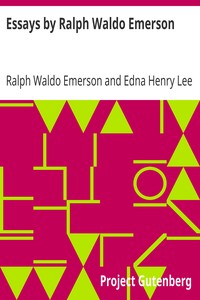
Essays by Ralph Waldo Emerson
Emerson, Ralph Waldo
Category: Essays
1. The text discusses Ralph Waldo Emerson's works, focusing on various essays such as "Nature," "Shakespeare; or, The Poet," and "Circles."
2. Key themes in the text include Emerson's admiration for nature and its transcendental relationship with humanity, his deep appreciation for Shakespeare's genius and ability to touch generations of readers, and his exploration of human progress through examples like the evolution of printing, steam engines, and the telegraph.
3. The text also mentions various historical figures such as St. Augustine, Greek philosophers Aristotle and Plato, Italian authors Petrarch, Ariosto, and Edward Young, and English Puritans.
4. Emerson's essays encourage readers to seek personal truth through direct interaction with nature, stand firm in their beliefs, and maintain an eternal perspective on life's events.
5. Quote: "Trifles make disturbances; great troubles seldom." (Emerson, Self-Reliance)
2. Key themes in the text include Emerson's admiration for nature and its transcendental relationship with humanity, his deep appreciation for Shakespeare's genius and ability to touch generations of readers, and his exploration of human progress through examples like the evolution of printing, steam engines, and the telegraph.
3. The text also mentions various historical figures such as St. Augustine, Greek philosophers Aristotle and Plato, Italian authors Petrarch, Ariosto, and Edward Young, and English Puritans.
4. Emerson's essays encourage readers to seek personal truth through direct interaction with nature, stand firm in their beliefs, and maintain an eternal perspective on life's events.
5. Quote: "Trifles make disturbances; great troubles seldom." (Emerson, Self-Reliance)
Summary
1. The text discusses Ralph Waldo Emerson's works, focusing on various essays such as "Nature," "Shakespeare; or, The Poet," and "Circles."
2. Key themes in the text include Emerson's admiration for nature and its transcendental relationship with humanity, his deep appreciation for Shakespeare's genius and ability to touch generations of readers, and his exploration of human progress through examples like the evolution of printing, steam engines, and the telegraph.
3. The text also mentions various historical figures such as St. Augustine, Greek philosophers Aristotle and Plato, Italian authors Petrarch, Ariosto, and Edward Young, and English Puritans.
4. Emerson's essays encourage readers to seek personal truth through direct interaction with nature, stand firm in their beliefs, and maintain an eternal perspective on life's events.
5. Quote: "Trifles make disturbances; great troubles seldom." (Emerson, Self-Reliance)
2. Key themes in the text include Emerson's admiration for nature and its transcendental relationship with humanity, his deep appreciation for Shakespeare's genius and ability to touch generations of readers, and his exploration of human progress through examples like the evolution of printing, steam engines, and the telegraph.
3. The text also mentions various historical figures such as St. Augustine, Greek philosophers Aristotle and Plato, Italian authors Petrarch, Ariosto, and Edward Young, and English Puritans.
4. Emerson's essays encourage readers to seek personal truth through direct interaction with nature, stand firm in their beliefs, and maintain an eternal perspective on life's events.
5. Quote: "Trifles make disturbances; great troubles seldom." (Emerson, Self-Reliance)
Is this summary inaccurate?
Please log in to report issues with this summary.
Reviews
No ratings yet
Please log in to leave a review.
No reviews yet. Be the first to review this summary.